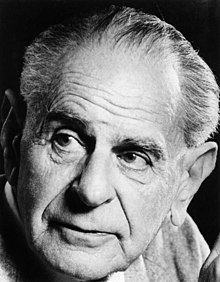I recently read the book Unended Quest which is an intellectual autobiography of Karl Popper. Karl Popper is likely the most influential philosopher of science ever. The book is a good mix of details of his life, accounts of his interactions with some famous scientists and philosophers, and explanations of his own big ideas. I highly recommend it. One of the first ideas Popper remembered pondering during his younger years was the amount of time spent on precisely defining words. Interestingly enough, this turned into a passion of his as he aged, when analytical philosophy was just beginning to catch on in Europe. With Wittgenstein leading the way, it became a prominent characteristic of the analytical school of philosophy to rigorously define all technical terms ahead of time in order to prevent misunderstandings during the presentation of a theory or argument. Popper was notably against this trend, arguing that it amounted to a waste of time and effort.
Whether in analytical philosophy or any other context, "clarity" and "precision" are usually the reasons given for rigorously defining words ahead of time. By defining words on the front end, the theory or argument can be followed more easily, and is more likely to be successful. Popper objects, declaring that it is impossible to prevent misunderstanding of a theory, no matter how much time and effort is spent on defining terms. Human languages just are, by nature, imprecise. There is really no way around this.
To understand why this is true, consider the following. If I spend time precisely defining every word in a theory or argument, I now have a new set of statements which contain technical words and can potentially be misunderstood. In order to limit misunderstandings, I must then attempt to precisely define each word in this set of statements, which will inevitably create a new set of statements which could potentially be misunderstood. As the reader can see, this will lead to an infinite regress where words will need to be defined forever, in order to prevent misunderstanding.
Obviously this is not how it works out in practice though. No philosopher or scientist that I know of has found him or herself in an infinite loop, constantly defining words. So, the definitions clearly do stop at some point. But where and how can I stop this string of definitions in a way that is non-arbitrary? There are two options here. I could continue to define technical terms until I am eventually left with only commonly used words. But this will simply not do, because common words are often misunderstood and are rarely precise. If I settle with basing technical definitions on common terminology, I have effectively defeated the purpose which I set out to achieve. So what is the other option? The other option would be to settle, at some point, for allowing the technical terms in my definitions to be understood from the context of my theory or argument. But if this is the case, then why not just let the original words be understood in the context of the theory?
It seems, therefore, that any overly-enthusiastic campaign to rigorously define terminology up front is a waste of time. Misunderstandings will occur inevitably whether terms are defined or not and perfect precision and clarity are impossible in practice. Misunderstandings can be dealt with as they come up or are identified.
Whether in analytical philosophy or any other context, "clarity" and "precision" are usually the reasons given for rigorously defining words ahead of time. By defining words on the front end, the theory or argument can be followed more easily, and is more likely to be successful. Popper objects, declaring that it is impossible to prevent misunderstanding of a theory, no matter how much time and effort is spent on defining terms. Human languages just are, by nature, imprecise. There is really no way around this.
To understand why this is true, consider the following. If I spend time precisely defining every word in a theory or argument, I now have a new set of statements which contain technical words and can potentially be misunderstood. In order to limit misunderstandings, I must then attempt to precisely define each word in this set of statements, which will inevitably create a new set of statements which could potentially be misunderstood. As the reader can see, this will lead to an infinite regress where words will need to be defined forever, in order to prevent misunderstanding.
Obviously this is not how it works out in practice though. No philosopher or scientist that I know of has found him or herself in an infinite loop, constantly defining words. So, the definitions clearly do stop at some point. But where and how can I stop this string of definitions in a way that is non-arbitrary? There are two options here. I could continue to define technical terms until I am eventually left with only commonly used words. But this will simply not do, because common words are often misunderstood and are rarely precise. If I settle with basing technical definitions on common terminology, I have effectively defeated the purpose which I set out to achieve. So what is the other option? The other option would be to settle, at some point, for allowing the technical terms in my definitions to be understood from the context of my theory or argument. But if this is the case, then why not just let the original words be understood in the context of the theory?
It seems, therefore, that any overly-enthusiastic campaign to rigorously define terminology up front is a waste of time. Misunderstandings will occur inevitably whether terms are defined or not and perfect precision and clarity are impossible in practice. Misunderstandings can be dealt with as they come up or are identified.



0 comments :
Post a Comment